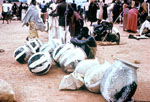|
Kigali:
|
Kigali is a small but beautiful city with an incredible variety of flowering trees and shrubs. It was once a center for trading. The city became a regional center from 1919 to 1962, when the Belgians were in control. After Rwanda's independence in 1962, it was chosen to be the nation's capital. Kigali stretches over four hills, and has different settlements - there is a Muslim quarter, a squatter's community, and the industrial region. The main offices of the cassiterite (tin) companies are located here in Kigali. The city is well-connected to the borders of the country.
|
|

Market
©2002: Africa Focus
|
|
History:
Rwanda is a small, densely populated, landlocked country in Central Africa, who became independ in 1962, after
colonization by Germany (1899) Rwanda (Ruanda-Urundi at the time) came under Belgian rule as early as 1919, when
Belgium received a "B-mandate" from the League of Nations, after it had conquered a part of German East Africa in
the course of World War I. In 1961 its monarchical government was formally abolished by a referendum and the first
parliamentary elections were held. Ethnic conflicts between the Tutsis, who represent 15 percent of the population,
and the Hutus who represent over 80% of the population, have engulfed the country for decades. These conflicts
triggered the displacement of tens of thousands of Tutsis to neighboring countries in 1959, 1969, and 1972. This
recurring ethnic strife, as well as a Government policy prohibiting the return of exiles, culminated in a large-scale
armed invasion of Rwanda in October 1990 by the Rwanda Patriotic Front (RPF), composed mainly of exiled Tutsis.
The RPF sought political reforms and the rights of all exiles to return to Rwanda; its army fought the Government’s
mainly Hutu army to a stalemate. A peace agreement known as the Arusha Accords, mediated by the international
community, was signed by the Government and the RPF in Arusha, Tanzania in August 1993. It provided for the formation
of a united national government and the integration of the two armies. However, the implementation of the accord was
delayed due to opposition by Hutu extremists. The subsequent deaths of the presidents of Rwanda and Burundi in a plane
crash over Kigali sparked a well-organized Hutu extremist uprising. With the support of the army, Hutu extremists
engaged in genocide, killing up to 800,000 people, mostly Tutsis and also moderate Hutus. The RPF responded by
ousting the government and its army, and about 2 million Hutus fled Rwanda into refugee camps in neighboring countries.
A transitional Government of National Unity, formed along the lines of the Arusha Accords, was sworn in July 1994 under
the presidency of Pasteur Bizimungu. The new government included representatives of the 5 major political parties,
from both the Hutu and Tutsi ethnic groups. The dominant parties in the Government are the RPF, now chaired by
vice-president Paul Kagame, and the "Mouvement Démocratique Rwandais" (MDR), now chaired by Prime Minister Rwigema.
Following the installation of the new government, about 800,000 exiles from previous conflicts returned to Rwanda.
Many of the 1994 Hutu exiles also returned to Rwanda in 1996/97 and have been resettled and reintegrated into the
society and economy.
Enabling us to improve the quality of the content, if you have additonal information, remarks or suggestions, please
share it with us by e-mail.
BRUSSELS/BELGIUM: 30 April 2009:
BRUSSELS AIRLINES flies Africa

In 2002 SN Brussels Airlines was created to continue in the
steps of the two companies Sabena and DAT, who between them had an unequalled safety record. BRUSSELS AIRLINES was created
following the merger of SN Brussels Airlines (SNBA) and Virgin Express. On 12 April 2005, SN Airholding, the company behind SNBA,
signed an agreement with Richard Branson, giving it control over Virgin Express. On 7 November 2006, the new name,
Brussels Airlines, was announced at a press conference at Brussels Airport. Brussels Airlines began operations on 25 March 2007.
On September 15, 2008 it was announced that Lufthansa will acquire a 45% stake in Brussels Airlines with an option to acquire
the remaining 55% from 2011. As a part of this deal Brussels Airlines will join Star Alliance. On March 13, Brussels Airlines
announced that the airline will codeshare all their flights to Germany with Lufthansa. The codeshare agreement will start from March 29.
This new step is part of the integration of Brussels Airlines into the Star Alliance network. Brussels Airlines becomes a
Star Alliance member in 2009.
From 26 April 2002 SN Brussels Airlines opened frequent Africa connections and presently BRUSSELS AIRLINES serves safe and reliable flights to:
ANGOLA (Luanda) - BURUNDI (Bujumbura) - CAMEROON (Douala & Yaoundé) - CôTE D'IVOIR (Abidjan) - DEMOCRATIC REPUBLIC OF THE CONGO
(Kinshasa) - THE GAMBIA (Banjul (Banjul) - GUINEA (Conakry) - KENYA (Nairobi) - LIBERIA (Monrovia) - RWANDA (Kigali) -
SENEGAL (Dakar) - SIERRA LEONE (Freetown) - UGANDA (Entebbe)
For further information click here and please tell them we sent you!
Last update: 30 April, 2009
|

